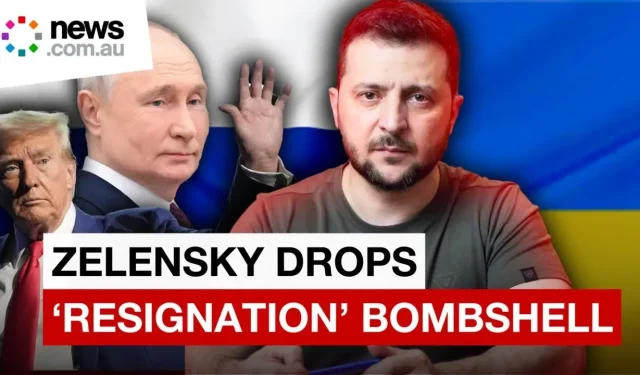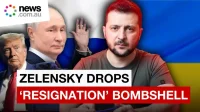Ukrainian President Volodymyr Zelensky recently shocked the world with his declaration that he would resign his position under specific conditions related to NATO membership or peace negotiations with Russia. This unexpected announcement comes amidst ongoing tensions in the Ukraine-Russia conflict, where Zelensky has emerged as a prominent leader since the war intensified in 2022. This article delves into Zelensky’s statement, the implications of his potential resignation, and the context surrounding his administration’s ongoing struggle for Ukraine’s sovereignty.
Zelensky’s Conditional Resignation
During a news conference, President Zelensky responded to a question regarding his willingness to resign, stating, “If you need me to leave this chair, I am ready to do that, and I also can exchange it for NATO membership for Ukraine.” This declaration signifies the depth of Zelensky’s commitment to Ukraine’s security. The potential for NATO membership is a significant factor for Ukraine, as it would not only bolster military support but also symbolize a critical pivot towards Western alignment amidst ongoing aggression from Russia.
Zelensky’s statement also highlights the complex dynamics in his relationships with Western leaders, particularly former U.S. President Donald Trump, who has openly criticized Zelensky in the past. By framing his possible resignation as a diplomatic maneuver for peace, Zelensky positions himself as a pragmatic leader focused on Ukraine’s long-term stability rather than clinging to power for power’s sake.
The Stakes Involved
The context of Zelensky’s announcement cannot be underestimated, especially considering that the U.S. has provided nearly $66 billion in military aid to Ukraine since the onset of the war. The geopolitical stakes have never been higher as Western nations, particularly those within NATO, evaluate how to respond to Russia’s aggressive posture. By tying his potential resignation to the crucial question of NATO membership, Zelensky forces international leaders to confront the realities of Ukraine’s defense needs and the implications of letting the country fall further into instability.
Moreover, the trade-offs inherent in this ultimatum suggest that Zelensky is not merely seeking political respite; he is actively pursuing a strategic avenue that could secure his nation’s future. His willingness to consider resignation for peace indicates a readiness to prioritize national interests over personal ambition. However, this raises essential questions about leadership in times of crisis: How far will leaders go to ensure the safety of their nation? And at what point does the need for stability clash with the democratic principles that leaders are expected to uphold?
The Impact of Domestic and International Relations
Zelensky’s public interactions with other world leaders, especially the contrasting relations with Joe Biden and Donald Trump, showcase the delicate balance he must maintain on the international stage. While he has received significant support from the Biden administration, Trump’s critiques have placed additional pressure on Zelensky. This dynamic was evident when Trump referred to Zelensky as a “dictator” as discussions on peace negotiations unfolded, exemplifying the friction between demands for democracy and necessary pragmatism in wartime.
This backdrop complicates Zelensky’s decision-making process and affects how the Ukrainian populace perceives their leadership during a time of extraordinary turmoil. As the idea of resigning for NATO membership becomes more pronounced, questions arise about the foundation of political accountability and the possible ramifications for Ukraine’s legislative framework. Would new elections truly represent the will of the people, or would they risk further destabilizing the current situation?
Conclusion
Zelensky’s declaration that he would step down for NATO membership or a peace deal with Russia forces a rethinking of leadership, responsibility, and the broader implications of geopolitical alliances in conflict zones. As Ukraine navigates its complicated relationship with NATO and seeks to preserve its sovereignty, the stakes are high. Will Zelensky’s bold move lead to a new chapter in Ukraine’s quest for security, or is it merely a reflection of the desperation for peace amid ongoing war?
As the international community watches closely, one must ponder: What sacrifices are warranted in pursuit of peace, and who bears the burden of these choices?
https://www.youtube.com/watch?v=IqNjMpjjHsw


